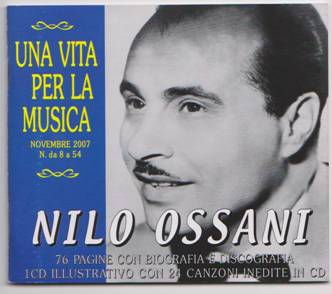Edizione del TimaClub

Nilo OSSANI: Una vita per la musica
Edizione del TimaClub

Admit it ? Did the name of Nilo Ossani ring a bell ? even at a distance of several kilometres ? No it didn’t. So it was left to Maurizio Tiberi to unearth some of the recordings by this fine completely forgotten tenor. Giuseppe Dal Pane (as was his real name) had a small pre-war operatic career as a second tenor at La Scala (Fisherman in Guillaume Tell) and a repertoire of two operas as primo tenore. After the war he often concertized till the early sixties in those once popular operatic concerts all over Europe with Italian singers (always from La Scala; even if the singer had never set a foot in that theatre)) for which he used his real name. In Italy he no longer sang in opera but became one of the more beloved radio singers in Italian and Neapolitan songs, operetta and popular songs. He made a lot of fine recordings just after the war until the moment the far more popular Carlo Buti started recording for Voce di Padrone and the company didn’t need Ossani/Dal Pane anymore. Still, there are some marked differences between the two singers. Buti is the far more honey-voiced singer; a timbre of almost incredibly richness and sweetness. But though Buti uses a fine belcanto technique he is and remains a pop singer with a limited top. Dal Pane doesn’t hide his operatic background and is a real tenor. On his best recordings he sounds somewhat like a cross between Nino Martini and a bit of Giacomo Lauri-Volpi. Obviously his voice was somewhat kissed by the mike and in the interesting detailed and long interview in the booklet (so sorry, but once more in Italian only) he freely admits his voice was ‘piccolo’. But he brings with him the utter conviction of generations of Italian singers for whom this repertoire was their daily breath. Nilo Ossani is not a Gigli, not a Di Stefano in hits like Core’ngrato or Musica Proibita but the (small) voice has personality and that typical sound only to be found with tenors born south of the Alps. The voice is charming and due to the fine top can easily compete with most post-war or even pre-war German tenors (exceptions made for Tauber, Schmidt, Konya). Indeed vocal buffs will appreciate the way he launches into Paganini or Friederike. Ossani’s stornelli are more straight forwardly sung than Buti’s many interpretations but they sound less laboured, less artificial. Once more we have to thank Maurizio Tiberi for this discovery and I personally wouldn’t mind a second record by this lovely tenor.
Jan Neckers